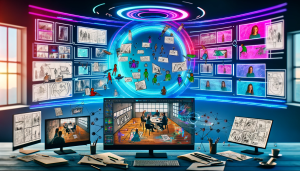 UseCasesFor.ai
UseCasesFor.ai
Choose Topic
 UseCasesFor.ai
UseCasesFor.ai
AI Use Cases
A collection of over 250 uses for artificial intelligence
A continually updated list exploring how different types of AI are used across various industries and AI disciplines,including generative AI use cases, banking AI use cases, AI use cases in healthcare, AI use cases in government, AI use cases in insurance, and more

Sign up
to receive a PDF containing all the use cases and stay updated with the latest AI trends and news (you can always unsubscribe)
Storyboard generation

Introduction
It is important to note that the entertainment industry has been a trendsetter in the integration of technology and new ways of presenting content with the help of digital tools. Another such revolutionary concept that has gained immense popularity in the recent years is the use of Artificial Intelligence in storyboard creation. As an important phase in the film making and animation process, storyboarding has been a manual and tedious process. But, the application of AI especially the Generative AI (Gen AI) has the possibility of shifting this paradigm. Some of the latest Generative AI algorithms are capable of analysing the various styles of different storyboard artists and create new frames of a storyboard which is a great advancement in the art of storytelling.
Challenges
There are however some challenges that the entertainment industry faces in the adoption of Gen AI for storyboard generation. The first challenge is how to balance between creativity and automation since AI generative models can create storyboards. Also, to train AI models one needs a lot of data which may not always be readily available or easily obtained. Another challenge is the fear of losing their jobs by the people in the creative sector of the society. Also, there are still concerns regarding the copyright and intellectual property rights when it comes to AI creating storyboards as some of the issues are still not well defined.
AI Solutions
In order to address these issues, companies are creating smarter artificial intelligence solutions. For example, the AI start-up Pencil uses the Gen AI to create script-to-storyboard conversion automatically. Some of the world’s leading animation companies including DreamWorks have been integrating AI tools that assist in the creation of characters and scenes. Disney Research has created an AI that can forecast the audience of a film on the basis of its plot. These tools not only help in speeding up the process of creating storyboards but also open up new possibilities for creativity. They come with sophisticated machine learning algorithms that can be taught to emulate a specific aesthetic choice, while at the same time, adhering to the intended concept. To deal with the problem of job loss, these tools are being depicted as ‘assistants’ by companies rather than their replacements, and the goal is to enhance the skills of artists instead of substituting them.
Benefits
There are several advantages of Gen AI in storyboard generation. It cuts down the effort and time required for creating storyboards, thus speeding up the pre-production process. AI can create a number of storyboards within the time that it will take a human artist, this enables iterations and adjustments. It also enables artists to concentrate on other aspects of their work and creativity. This is because AI has the capacity to mimic certain artistic styles and thus preserve the visual coherence of a project. Furthermore, AI has the capacity to generate new ideas and ideas which might not have been thought of by a human, thus enhancing creativity.
Return on Investment
It is possible to realize a high ROI when applying Gen AI in storyboard creation, for example. This way, a significant part of the process can be automated, thus reducing the costs for labor. Faster storyboard creation will also help in reducing the project cycle time and may result in faster time-to-market and hence increased revenue. In addition, the enhanced quality and innovation of the storyboards may result to enhanced audience appreciation and better box office collection. Although there are costs to investing in new AI technology, the return on investment can be quite large in the future.